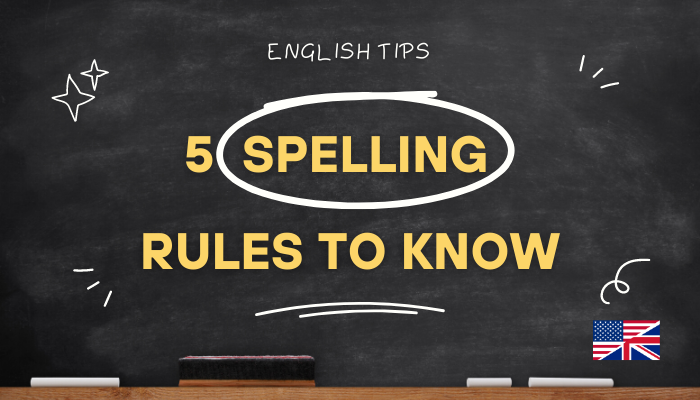Great site to keep my english skills updated for work and travel. I am really enjoying the lessons!
Maria C
 Argentina
Argentina


Anyone who has ever had to memorize a tough-to-spell English word (It’s fuchsia, right? Or is it fuschia? Fushia?) has noticed that the spelling of some words is wildly different from the way we pronounce them. To make matters worse, some words are spelled differently in American English and British English. If it makes you feel any better, the eccentricities of English spelling weren’t invented just to make life difficult for writers.
5 spelling rules to know
1. I Before E, Except After C
The rule goes like this:
I before E, Except after C, unless it sounds like A, as in neighbor or weigh
There are many exceptions to this rule—maybe it’s better to think of it as a guideline—but it can be helpful with words like the ones below.
I before E
Correct Would you like a piece of cake? Jerry will believe anything. They’re planting new grass on the football field.
Except after C
Correct Darnell received an A on his spelling test. Jeremy spotted a spider on the ceiling. I never expected such deceit from you!
Unless it sounds like A
Correct Our neighbors live in a beige house. How much does the kitten weigh?
2. Adding suffixes to words that end in y
When you add a suffix that starts with e (such as -ed, -er, or -est) to a word that ends in y, the y usually changes to an i.
Correct This is the dustiest old house I’ve ever seen. The best bakers make the flakiest pie crusts. The soup needs the tiniest pinch of salt, and then it’s perfect. Seawater dries out your skin.
The y doesn’t change for the suffix -ing.
Correct The baby has been crying for almost an hour. The minute we brought in the new puppy, our mother began laying down sheets of newspaper. We should spend some time tidying before the guests arrive.
If the word in question has two consonants before the y, change the y to i before adding the suffix -ly.
Correct Funnily enough, I said the same thing just yesterday.
Of course, there are always exceptions:
Correct “Funny,” he said dryly.
3. The silent e
Typically, an e after a consonant at the end of a word is silent, but it does affect the way you pronounce the vowel that comes before the consonant. The e makes the vowel sound of the word (or syllable) long (like the I sound in "kite") instead of short (like the I sound in "kitten"). It’s important to get the silent e right, because its presence or absence can change the meaning of a word.
Example The monkey bit me. Keep your fingers out of the cage: the monkeys bite .
By adding the e to the end of "bit", the word is changed from past to present tense.
Example Don’t cut yourself on the sharp knives. The kitten is really cute .
In this case, the silent e creates a completely different word.
4. Double consonants
Watch out for double consonants. It can be difficult to hear them when a word is said aloud—especially if the word has only one syllable. Double consonants are frequently found in words that have suffixes added to them:
Example I dropped the heavy bags to the floor. Someone called for you earlier.
Some words can be pronounced as either one or two syllables, but the spelling remains the same:
Example Blessed are the meek for they shall inherit the Earth.
In this sentence, which is a fixed expression, "blessed" is pronounced as two syllables: "bless-ed".
Example The father blessed his son before the wedding.
In this sentence, blessed is pronounced as one syllable: "blest".
Be particularly careful with words where a double consonant can change the pronunciation and the meaning of the word.
Example Cacti are native to the desert . Would you like ice cream for dessert ?
5. Plural suffixes
When do you add s and when do you add -es to make a plural? It’s not quite as arbitrary as it may seem. The rule is this: if a word ends in -s, -sh, -ch, -x, or -z, you add -es.
Correct I only had to take one bus; you had to take two buses. I only get one wish; you get two wishes. I have a splotch on my shirt; you have two splotches. I’m carrying one box; you’re carrying two boxes. Would you like a spritz of perfume? Two spritzes, please.
For all other endings, add -s.
Correct I have one cat; you have two cats. I have one cup; you have two cups. I have one shoe; you have two shoes. Where is my other shoe? I have one ski; you have two skis. How am I supposed to ski? I have one toque; you have two toques.
Be careful of words that don’t change when they’re pluralized (e.g., fish, sheep, moose). If you’re unsure, check the dictionary.
Controlla il tuo punteggio - Prova il nostro quiz inglese gratuito + Ottieni un bonus gratuito